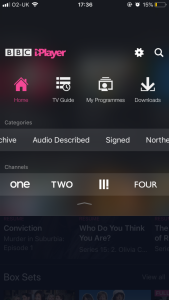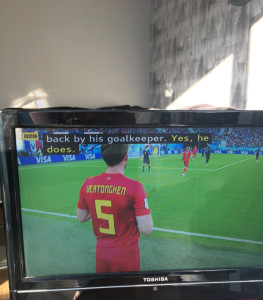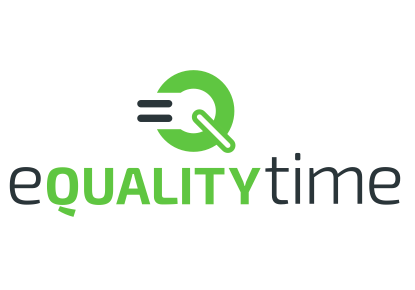After a short corraspondence with the wonderful Emma Colton, who writes the equaly wonderful The Happy Hearing Aid blog she sent us this amazing piece on the trials and troubles with dealing with TV subtitles. I hope you enjoy it as much as we did.
A few years ago, while still at University, I was a reality TV fiend. I couldn’t get enough of it. I would watch The Only Way is Essex (TOWIE), Made In Chelsea and Geordie Shore without fail. As I’ve gotten older, and more mature (I promise!!) I gave up these programmes for more pressing matters such as… getting my degree!
This year was all about trying new things and this meant I gave into my reality TV ban. I’d joined the rest of the world by watching Love Island. I had never watched a series before but, as most of my friends raved about how good it was, I thought I’d give it a go. I even went as far as to download the ITV Hub app in case I missed an episode.
Despite succumbing to the trend, I can proudly say I do not watch it religiously. I do need some down time though and therefore I attempt to watch it on ITV Hub online or on my phone app.
If you’re a regular reader of my blogs then you will know I struggle to watch TV without subtitles. I am so used to having them on the screen (much to my family’s annoyance) due to having lived with deaf people and I feel like it is a security blanket for me in case I mishear something as I often do when my ear infections returns.
So, let me set the scene: I’m snuggled up in bed with my cuddly toy that I’ve had since I was 2 (you’re never too old for your childhood teddies), with my PJs on and a soothing mint tea. I was all set to embark on the magical world that is trash TV and went online to choose the latest Love Island episode (I had missed it when it first aired).

The adverts were running and there was no option to turn on subtitles. I assumed as it’s just the adverts (not that that’s a good enough excuse) there were no subtitles as this is standard even at the cinema. I thought I’d just wait until the programme started.
Fast forward to 3 minutes and the opening titles have come on and and there are still no subtitles. In utter panic I turn to my phone and try to watch the episode on there. The same thing happened! There was just no option but to watch the programme without subtitles.
The mobile app and the website for ITV will only let you watch a show with subtitles once the episode is at least a day old, it is not ready straightaway. How is this useful to deaf people who want to be accessing programmes on ITV Catch Up? Why should anybody have to wait for subtitles if they need it? The fact a deaf person would have to wait until an episode is older than a day to get subtitles is OUTRAGEOUS!! I’ve been told in the past that some of my blogs can come across as angry… but…I am!
The whole point of Love Island is that it is on daily for you to see what the contestants have been up to on that day. This system that ITV have means people who rely on subtitles for access will always be one day behind everyone else which ironically reflects the perception of deaf people from the hearing world anyway. Deaf people are seen as behind mainstream children with language development, behind academically (even though deafness is not a learning disability) and behind on accessing information due to a delay from interpreters relaying information which is unavoidable.
In addition when the subtitles are working, they do not always match what is being said on the TV. Lots of things were missed out which means people relying on subtitles are not gaining full access to the show like a hearing person would.
Deaf educators and people who work in the deaf charity sector are working hard in trying to bridge the gap that deaf people face in a hearing world and society yet we are letting them and the deaf community down by removing something that is so easy to solve.
CURIOSITY KILLED THE CAT.
As the proverb says ‘curiosity killed the cat’ – I could not help myself but to go onto BBC iPlayer and see what they were offering the deaf community.
The BBC iplayer service has very clear categories displayed ranging from films to documentaries and ‘signed’ to ‘audio description’ – finally some accessibility!

I wanted to try these out for myself and started to watch ‘Who Do You Think You Are?’ from the ‘signed’ category – waiting for the signer to appear. Nothing happened. There were subtitles, but the whole point of the category is that there is British Sign Language being used for access.
People often say to me ‘Oh have you ever thought about being one of those sign language interpreters on TV who sign the news at 5am’? Everybody is aware of these irregular timings for interpreted programmes. It is a well known ‘joke’ in the hearing world and it shouldn’t be like this. I wish there was a TV remote that allowed you to press a button to activate a BSL interpreter. Who wants to join me in developing this and going on Dragons Den?
Not all deaf people have strong reading skills and the signing aspect on the programmes will allow people to access the show in their first language. This happened on three other programmes I had clicked on in this category. Some did have the intended signer, but it was not consistent at all.
During the World Cup the subtitles were very conveniently placed covering the score…

It meant that I had to turn them off to know what was going on score-wise. Being forced to turn the subtitles off means that deaf people are not accessing the commentary. We had waited four years for this – you would have thought someone would have realised placing them in this position was pointless!
Subtitles are a constant battle for the deaf community. There have been many recent petitions on this topic from access at the cinema to many complaints from the public on Netflix and how there are words missing from their subtitles. YouTube is an example of very poor subtitling as most of the time they are done through an automatic voice recognition system that mishears the words. I recently watched something where ‘keen’ came up as ‘key’. When you are hearing, you likely wouldn’t realise that this is wrong. As a deaf person, it is likely you would not be able to realise keen was the intended word. It is confusing and stressful. That deaf person would have to have a really strong understanding of English to realise it was not the intended work.
This needs to change, we need to have subtitles on programmes that are accurate, consistent and reliable. When will this become the reality?
I have previously written about subtitles in cinemas. To read more about this, please see: When going to the CinEMMA
